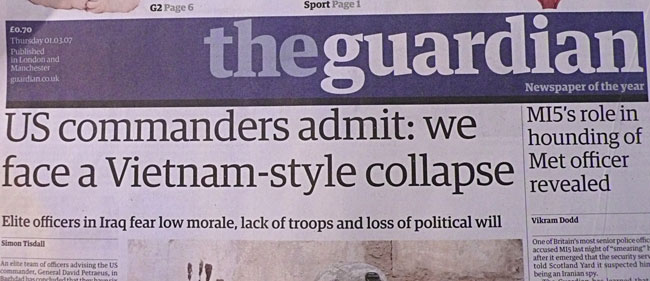I watched yesterday’s Bush press conference. There’s absolutely no doubt that he’s selling war with Iran. And this morning, I saw CNN help him with the pitch.
According to CNN, our sometime enemy in Iraq, radical Shi’ite cleric Moqtada al-Sadr, may now be in Iran. He may not be there, but it’s possible that he’s there. Right now. That was the news, it was a headline, scoop-level story. We’re not sure he’s there, but he could be. That’s news? Eh.
They also said, but didn’t emphasize, that if he were in Iran this wouldn’t be anything new, he’s often in Iran.
He’s also part of the coalition that forms the government of Iraq, the one that we’re supporting, the one that we’re funding, and arming. But this time, today, they didn’t mention that he’s our friend in Iraq, because today he’s being portrayed as our enemy in Iraq. But given that he’s part of the government of Iraq, him being in Iran is like Ted Kennedy being in Mexico. It’s conceivable that al-Sadr has legitimate business in Iran. But it’s hard for us to conceive of that, supposedly, because the picture that’s being painted is that Iran is the country that’s killing our soldiers. And we’re supposed to conclude, of course, that al-Sadr, being in Iran (if he actually is) is more evidence of that. They don’t say it, but we’re left wondering why this is news. If he isn’t there plotting the deaths of more Americans, exactly why is he in Iran? (Assuming he is.) Clearly he’s up to no good.
In other words, they’re just moving around words to make it sound like something new and dangerous is happening, when in fact nothing new is happening, and if it is dangerous, it is something that in the past, the same people have asked us to overlook the danger in.
One more thing — in the Bush press conference, not only haven’t the reporters asked Bush to explain who the enemy is, they also talk about the enemy themselves, although if pressed, I doubt if any of them could explain exactly who the enemy is. Maybe they should do a Frontline special explaining the complicity of the professional journalists in U.S. propoganda.
Summary: One day al-Sadr is the enemy and another day he is our ally.
What could “winning” in Iraq possibly mean?
Problem: We have no clue who we’re fighting.

